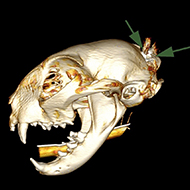
Neurology team performed lifesaving surgery.
A two-year old cat with a gun pellet in the back of his head has pulled through after being found unresponsive in his owner's driveway.
Marco, a domestic shorthair cat, was rushed to the local vets when his owner found him collapsed and unresponsive. After being stabilised, Marco was referred to the Neurology and Neurosurgery surgery at Davies Veterinary Specialists for treatment.
Neurosurgeon Victoria Argent explained: “We performed a CT scan to help identify the location of the pellet more precisely before we operated.
“The CT also revealed a depression fracture in the parietal bone and there was concern of migration of the pellet within the brain.”
Working together with neurosurgeon Alex Forward and the anaesthesia team, Victoria carried our a craniectomy.
Victoria said: “Given the location of the bullet avoiding important vessels, as well as delicate manipulation of the fragment to avoid injury to the underlying brain parenchyma was key for the success of this procedure.”
The team flushed out the wound and released the gun pellet by carefully drilling the parietal bone. The depressed skull fracture was also removed, and the surgical site was flushed and closed in multiple layers.
“Marco was a perfect patient and recovered remarkably well, much to our delight – it’s not every day you have the challenge of removing a pellet from such a precarious place,” Victoria concluded.
Image (C) Davies Veterinary Specialists



 The RCVS has announced a new version of its 1CPD mobile app, with enhanced features for veterinary surgeons and veterinary nurses to record their continuing professional development.
The RCVS has announced a new version of its 1CPD mobile app, with enhanced features for veterinary surgeons and veterinary nurses to record their continuing professional development.